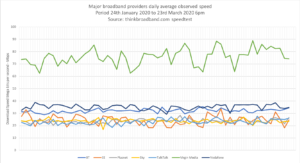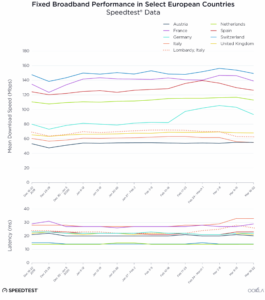ANDREW CAMPLING
DIRECTOR, 419 CONSULTING


IS THE INTERNET ABOUT TO COLLAPSE BECAUSE OF COVID-19?
MONDAY 30 MARCH
There have been a number of scare stories in the last weeks or so that suggest that the Internet is in imminent danger of collapse due to the coronavirus. Is there any truth in these stories or are the news articles in fact sophisticated clickbait?
Let’s consider the evidence, starting with the UK.
Firstly, let’s take a UK perspective. I was on a videoconference earlier this week hosted by the ISPA UK industry body with representation from many of the well-known ISPs. Between them they probably account for more than 90% of UK Internet traffic.
The consensus of all of those on the call was that there is not presently a problem with UK internet traffic levels, which are in fact running below the peaks that the networks have carried. The CTIO of BT Group, Howard Watson, recently put out a blog post to summarise some of the data on the BT network which can be found here. The other ISPs also have briefings, such as this one from Virgin Media
This view is supported by a report by Andrew Ferguson of industry site Think Broadband earlier this week which shows not deterioration in broadband speeds across aby of the main ISPs.
You can read Andrew’s report in full here.
What about other countries?
I was on a videoconference hosted by the Internet Society mid-week, with over 100 attendees from most European countries as well as the US. Attendees included representatives of carriers, ISPs, internet exchanges and others, so a well-informed group of people. Again, the consensus view was that the Internet was not in imminent danger of collapse, something which is backed up by the data.
The following charts from Ookla, a company that specializes in crowd-sourced speed tests, show a pretty steady picture for both broadband download speeds and “latency” (delay), the latter being a useful indication of contention on networks.
Mark Jackson gives an expanded explanation of this, also covering mobile networks, in an article on the industry site ISP Review from earlier this week which is accessible here. The Internet Society’s report on the resilience of the Internet can be found here.
That’s all very well but I’m struggling to work from home, what’s going on?
There are many factors that may cause problems that are not indicative of the Internet collapsing. For example:
- The position of your router: if you are relying on wi-fi to connect your devices to your router, make sure that the router is positioned away from other devices and electrical equipment, preferably on a table or shelf.
- Weak wi-fi signals: depending on the size of your home and nature of its construction, you may have blackspots where the signal is weak or non-existent. If you can’t reposition your router, try using Ethernet cables to connect to it or consider investing in either powerline boosters or a mesh network to enhance the wi-fi signal.
- Wi-Fi Competition: if you live in an urban area you may be surrounded by many other homes with routers that are all competing to use the limited number of channels available for wi-fi. If this is the case, a wired connection using an Ethernet cable may be your best option.
- Connection competition: if other family members are also working from home or streaming content, gaming etc, it may be that your broadband connection is busy. There may not be an easy fix to this other than agreeing to spread out your usage, unless you’re able to upgrade your service – speak to your ISP to see if this is an option.
- Overloaded Platforms: Some or the popular services and platforms are seeing big increases in traffic volumes which are affecting their performance. So sluggish responses or slow downloads may be indicative of the service that you’re using being overloaded rather than any issue with the Internet itself.
- Overloaded VPN: Many businesses require their employees to use virtual private networks (VPNs) to connect to company systems when they are working remotely. These VPNs may not have been designed for situations where everyone is working remotely at the same time, so it may be that the VPN is affecting the performance that you are experiencing rather than the Internet. This is a matter for your IT person to address.
You may find the more detailed guidance and links from Ofcom helpful, these can be found here.
Routine problems and unexpected outages can still affect performance, again these are not indicative of underlying problems with the Internet. Luckily the service providers are designated as offering essential services and so they or their suppliers (eg Openreach) are able to undertake repairs during the current lockdown. Note though that they are of course restricted on activity where access to premises is required.
In conclusion, is the Internet in imminent danger of collapse due to Covid-19. In short, no, don’t believe what you read in the press!
About the author: Andrew Campling has nearly 40 years experience in marketing and telecoms, runs 419 Consulting Limited, a public policy and public affairs consultancy focus on the tech and telecoms sectors.
If you would like to share an article or any advice to be included, please send it to [email protected]




